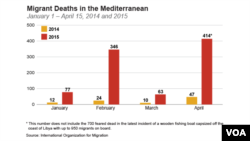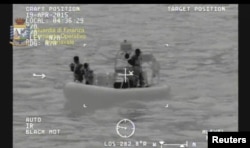International and humanitarian agencies are calling for swift action to prevent the deaths of migrants crossing the Mediterranean Sea from North Africa to Europe.
The latest disaster occurred late Saturday when a boat crammed with up to 700 migrants capsized near Libya. Only a few dozen survivors have been rescued, though search and rescue missions continue, according to International Organization for Migration spokesman Joel Millman.
"The waters are calm and the weather is fair right now, [so] the authorities believe there remains a chance to find people," Millman told VOA. "You know, it is a big sea out there and it is easy not to see people, but ... generally, if someone is missing they are drowned."
With the latest incident, the death toll this year will top 1,500, compared with 96 during the first four months of 2014, according to the organization. Most of the migrants making this perilous journey are from sub-Saharan Africa, Eritrea, Somalia and Syria.
European Union ministers are discussing possible solutions in Luxembourg.
The International Organization for Migration is asking the European Union to once again back life-saving operations on the scale of the Italian-run Mare Nostrum program. That program rescued thousands of migrants at sea, but was shut down last year on the grounds that it encouraged people to risk their lives on smugglers’ boats.
Creative response urged
Governments must become creative in their search for solutions, IOM spokesman Millman said.
"We know places like Agadez in Niger that are full of people on their way to Tripoli," he said. The Sudanese capital of Khartoum "is full of people on their way to Tripoli.
"These are very traditional points along the migrant route," he said, where organizations could set up computer-linked stations to register people "and start seeing who has family in one of these countries in Europe who could be qualified for a humanitarian visa, who could be resettled on a temporary basis."
Millman acknowledged opening such a channel could provoke a stampede of migrants. But he said a stampede for temporary legal entry to a country was preferable to mass slaughter on the seas.
The smugglers’ trade is flourishing in Libya because it is a failed, lawless state. The United Nations is mediating peace talks among warring parties there in an effort to reach a power-sharing agreement that could bring stability and curb human smuggling.






